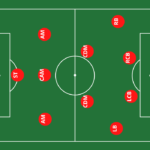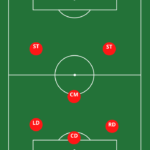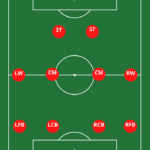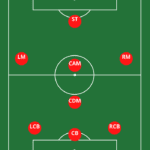- Last Updated -

The Importance of Keeping a Clean Sheet in soccer:
An Introduction to Soccer’s Most Coveted Record
Soccer is a sport that is as much about defending as it is about attacking. While scoring goals is undoubtedly the most exciting aspect of the game, defenders and goalkeepers play a crucial role in ensuring their team doesn’t concede any goals. One way of measuring this defensive effort is through the record known as a “clean sheet.”
A clean sheet refers to when a team has successfully prevented their opponents from scoring in an entire match. It’s a term that’s commonly used in soccer and one that holds significant importance for goalkeepers and teams alike.
A clean sheet can be seen as the ultimate form of defensive brilliance, where not even one goal slips past the keeper and into the back of the net. It’s important to note that keeping a clean sheet isn’t just about individual performances; it’s also about teamwork and discipline.
Defenders must work together to deny opponents any clear-cut chances on goal, while midfielders must track back to help out with defending too. The goalkeeper also plays an integral part in keeping their team’s defense organized, communicating with teammates to ensure they’re always well-positioned to deal with any threats from the opposition.

What is a Clean Sheet?
Clean sheet is a term used in soccer to describe a match in which one team does not concede any goals to their opponents. In other words, the team and its goalkeeper have kept a “clean sheet” throughout the game. The term originates from the practice of keeping clean sheets over mattresses to protect them from dust and dirt.
Keeping a clean sheet is essential for teams that want to win games and ultimately win championships. It can make all the difference between winning or losing, especially in close matches where every goal counts.
Moreover, it gives players and fans alike a sense of pride and satisfaction in knowing that their team’s defense was able to shut down the opposing team’s attack. For goalkeepers, keeping a clean sheet is often considered one of their primary duties on the field.
They are responsible for preventing goals by making saves, commanding their defenders, and organizing the defensive line. A goalkeeper who consistently keeps clean sheets is highly valued by their team and often recognized as one of the best at their position.
Overall, whether you’re a player or fan, understanding what it means to keep a clean sheet can greatly enhance your enjoyment of the game. It adds another layer of excitement when watching matches because you’re not just rooting for your team to score but also hoping they can keep their opponents from scoring as well.
The Importance of Keeping a Clean Sheet
Keeping clean sheets can have far-reaching implications for soccer teams that go beyond just winning individual games. For instance:
Firstly, it helps teams accumulate points over the course of an entire season or tournament which ultimately determines whether they finish at the top or bottom end of league tables. Secondly, keeping consistent clean sheets instills confidence within players that helps them build momentum throughout competitions.
Having strong defensive strategies helps teams advance further into knockout stages because they are better equipped defensively. Moreover, clean sheets are not just important for teams but also for individual players, especially goalkeepers.
They are considered one of the most important metrics of a goalkeeper’s success because it demonstrates their ability to keep the ball out of their net. A keeper who consistently keeps clean sheets is highly valued by their team and often recognized as one of the best at their position.
Keeping a clean sheet is an essential part of playing soccer, both for individual players and teams alike. It requires teamwork, strategy, and skill to achieve, but the rewards can be immense in terms of individual accolades and team success.

What is a Clean Sheet?
Clean sheet is a term used in soccer to describe a match in which one team does not concede any goals to their opponents. In other words, the team and its goalkeeper have kept a “clean sheet” throughout the game. The term originates from the practice of keeping clean sheets over mattresses to protect them from dust and dirt.
Keeping a clean sheet is essential for teams that want to win games and ultimately win championships. It can make all the difference between winning or losing, especially in close matches where every goal counts.
Moreover, it gives players and fans alike a sense of pride and satisfaction in knowing that their team’s defense was able to shut down the opposing team’s attack. For goalkeepers, keeping a clean sheet is often considered one of their primary duties on the field.
They are responsible for preventing goals by making saves, commanding their defenders, and organizing the defensive line. A goalkeeper who consistently keeps clean sheets is highly valued by their team and often recognized as one of the best at their position.
Overall, whether you’re a player or fan, understanding what it means to keep a clean sheet can greatly enhance your enjoyment of the game. It adds another layer of excitement when watching matches because you’re not just rooting for your team to score but also hoping they can keep their opponents from scoring as well.
The Importance of Keeping a Clean Sheet
Keeping clean sheets can have far-reaching implications for soccer teams that go beyond just winning individual games. For instance:
Firstly, it helps teams accumulate points over the course of an entire season or tournament which ultimately determines whether they finish at the top or bottom end of league tables. Secondly, keeping consistent clean sheets instills confidence within players that helps them build momentum throughout competitions.
Having strong defensive strategies helps teams advance further into knockout stages because they are better equipped defensively. Moreover, clean sheets are not just important for teams but also for individual players, especially goalkeepers.
They are considered one of the most important metrics of a goalkeeper’s success because it demonstrates their ability to keep the ball out of their net. A keeper who consistently keeps clean sheets is highly valued by their team and often recognized as one of the best at their position.
Keeping a clean sheet is an essential part of playing soccer, both for individual players and teams alike. It requires teamwork, strategy, and skill to achieve, but the rewards can be immense in terms of individual accolades and team success.

Records and Statistics Related to Clean Sheets
Top Goalkeepers with the Most Number of Clean Sheets in History
Clean sheets are a badge of honor for goalkeepers, and some have been incredibly successful in keeping the opposition from scoring. The legendary Italian goalkeeper, Dino Zoff, holds the record for most clean sheets across all competitions with an impressive 243 shutouts. Following closely behind him is Edwin van der Sar who kept a total of 197 clean sheets throughout his career that spanned across Ajax, Juventus, Fulham, and Manchester United.
Other notable names on the list include Peter Schmeichel (186), Petr Cech (186), and Iker Casillas (177). It’s not just their individual brilliance that helped them achieve these milestones; it was also due to their ability to form strong defensive units with their teams that made them successful in keeping a clean sheet.
Teams with the Highest Number of Clean Sheets in a Season or Tournament
Keeping clean sheets is not just important for goalkeepers but also for teams. Teams that keep more clean sheets tend to be more successful as they concede fewer goals and have better chances of winning matches. AC Milan holds the record for most consecutive clean sheets in European football reaching up to 10 during their triumphant Champions League campaign in 1994.
In terms of domestic leagues, Manchester United had an incredible season under Sir Alex Ferguson when they recorded 25 clean sheets out of 38 matches during the 2008-09 season which helped them win the Premier League title at a canter. Other notable mentions include Chelsea who managed to keep a total of 25 clean sheets during their title-winning campaign back in 2004/05.
It’s clear that keeping a clean sheet is crucial both at an individual level as well as at a team level. The records set by these goalkeepers and teams serve as a testament to the importance of defending in soccer and how it can lead to success on the pitch.
Interesting facts about clean sheets
The Art of Goalkeeping
Keeping a clean sheet in soccer is a true art form, and the best goalkeepers are adept at conceding zero goals in a game. The longest record for not conceding a goal belongs to Belgian goalkeeper, Stefano De Martino. He kept an astonishing 1,311-minute streak without letting in any goals between August 2015 and March 2016 while playing for his club, Royal Excelsior Virton.
Famous Matches
Some of the most memorable matches in soccer history have featured iconic moments of keeping a clean sheet. One such match was the Champions League final in 2005 between Liverpool and AC Milan.
Liverpool’s goalkeeper Jerzy Dudek put on one of the greatest performances by a goalie ever seen, making miracle saves to prevent Milan from scoring after they took an early lead. Liverpool eventually won on penalties after a dramatic comeback from 3-0 down.
Unusual records related to keeping a clean sheet, such as longest streak without conceding a goal
The Unbreakable Record
Edwin van der Sar holds the record for the most number of minutes without conceding in English Premier League history – an impressive achievement given that he played against some of the most talented players in Europe during his career. The Dutchman had an incredible run during his time at Manchester United; between November 2008 and February 2009 he went over 1,300 minutes without letting in any goals.
The Perfect Season
Arsenal holds the record for going through an entire season (38 games) without losing any matches – known as “The Invincibles.” During their unbeaten season (2003-04), goalkeeper Jens Lehmann kept 15 clean sheets and only conceded 26 goals.
The Forgotten Heroes: Defenders
While goalkeepers are usually the ones credited with keeping a clean sheet, they wouldn’t be able to do it without the help of their defenders. In fact, some defenders hold records for keeping consecutive clean sheets in league history. Brian Clough of Nottingham Forest holds the record for 1,139 minutes without conceding in England’s first division, while Fabio Cannavaro went 745 minutes without letting a goal in during his time at Juventus.

Conclusion
Keeping it Clean: Recap of Key Points
A clean sheet is one of the most important statistics in soccer. It refers to a game where a team or goalkeeper doesn’t concede any goals. The term has become an essential part of the sport, and it’s as crucial to goalkeepers as scoring is to strikers.
To achieve a clean sheet requires a combination of individual and team efforts. Goalkeepers need to be in top form, using their skills and knowledge to stop any attempts at goal.
Defenders play an essential role by restricting the opposing team’s attacks and minimizing their chances at shooting. The rest of the team also plays its part by providing support and creating opportunities for counter-attacks.
Keeping a clean sheet is significant because it not only helps win matches but also builds confidence for both goalkeepers and teams. The ability to keep the opponent from scoring can change the momentum of a game, giving players more control on offense and defense.
Looking Ahead: Clean Sheets in Soccer’s Future
With advancements in technology, soccer teams now have access to sophisticated tracking systems that provide detailed analysis on every aspect of the game. This technology will likely play an increasingly significant role in helping teams strategize for achieving clean sheets.
In addition, there has been increasing focus on developing young talents into proficient defenders that can help keep sheets clean consistently over time. This renewed focus should help elevate defensive efforts across many leagues worldwide.
As we conclude our discussion about what is a “clean sheet” in soccer, let us be reminded that while it takes individual effort to achieve this statistic, teamwork is equally important. So if you’re playing goalie or defending your turf during your next match – think about how you can work with your teammates towards achieving this milestone! (1)
FAQs - Clean Sheet In Soccer
What is a clean sheet in soccer?
- A clean sheet in soccer occurs when a team, including the goalkeeper, successfully prevents their opponents from scoring any goals in a match.
Why is keeping a clean sheet important in soccer?
- Keeping a clean sheet is crucial for team success. It can make the difference in winning games, especially in close matches, and helps teams accumulate points throughout a season or tournament. For goalkeepers, it is a primary duty and a key metric of their success.
What does achieving a clean sheet signify for a team?
- Achieving a clean sheet signifies defensive brilliance, teamwork, discipline, and the ability to shut down the opposing team’s attack, building confidence and momentum for both goalkeepers and teams.
Who holds the record for most clean sheets in soccer history?
- Dino Zoff holds the record for most clean sheets in history with 243 shutouts. Other notable goalkeepers include Edwin van der Sar, Peter Schmeichel, Petr Cech, and Iker Casillas.
Are there any famous matches or records related to clean sheets in soccer?
- Famous matches include the 2005 Champions League final. Notable records include Edwin van der Sar’s longest streak without conceding in the English Premier League and Arsenal’s unbeaten season with 15 clean sheets kept by Jens Lehmann.
How does technology and player development affect clean sheets in soccer?
- Advancements in technology and a focus on developing proficient defenders are expected to elevate defensive efforts in soccer, potentially leading to more consistent clean sheets.
The Historical Dominance of Brazilian Soccer in the World Cup
Introduction: The Beautiful Game's Grandest Stage The World Cup, a grand tournament...
Read MoreIntroduction: Demystifying a Controversial Issue Soccer is a sport that requires specific...
Read MoreHow To Be A Good Soccer Parent! A Guide to Sideline Etiquette
What Makes A Good Soccer Parent? As a soccer parent, you have...
Read MoreSoccer Yellow Card … What Does It Mean?
Yellow cards are used to maintain order and fairness on the soccer...
Read MoreUnderstanding the Six Soccer Defensive Positions
In this article, focused on six defensive positions: goalkeeper (GK), sweeper (SW),...
Read MoreThe Highest Scoring Games In Soccer History
Phew, after reading about the seven worst blowouts in soccer history, I...
Read MoreThe Power of a Goal in Soccer, How it Influences The Game
Football, commonly known as soccer, has established itself as a globally renowned...
Read MoreMastering the 4-3-3 Soccer Formation
Here Are Some Teams That Have Mastered the 4-3-3 Soccer Formation -...
Read More7v7 Soccer Formations
Choosing the right 7v7 soccer formation is crucial for success on the...
Read MoreMastering the 4-4-2 Soccer Formation
The 4-4-2 soccer formation is one of the most popular formations used...
Read MoreCan Soccer Cleats Be Used For Baseball?… Pros and Cons…
Soccer and baseball are two different sports that require specific types of...
Read MoreUS Youth Soccer: Everything You Need to Know
US Youth Soccer (USYS) is the largest youth sports organization in the...
Read MoreBest Soccer Backpacks 2024
Soccer demands that you carry gear, such as balls, cleats, uniforms, water...
Read MoreHow Many Soccer Players Are On A Field?
The standard number of players on a soccer team is eleven. Each...
Read MoreAll About Soccer – Almost Everything You Need To Know
What Is Soccer? Soccer, also known as Association Football, is a popular...
Read MoreUnderstanding the Offside Rule in Soccer
Soccer, also known as football, is one of the most popular sports...
Read MoreSoccer Goalie Rules: Understanding the Goalkeeper Position
As soccer players try to gain control of the game, midfielders are...
Read MoreChoosing the Right Soccer Ball Size by Age
Soccer is undeniably one of the most popular sports in the world,...
Read More7 Tips To Becoming A Great Soccer Striker
A great soccer striker is a player who has the ability to...
Read MoreBest Soccer Cleats For Defenders 2024
What are the Best Soccer Cleats for Defenders? In our opinion, the...
Read MoreBest Soccer Cleats For Wide Feet 2024
The world of soccer is vast, and players come in all shapes...
Read MoreHow Many Soccer Games In A Season
The number of soccer games in a season varies depending on the...
Read MoreThe Ultimate Guide to Soccer Field Size
How big is a soccer field? Read this post and get a...
Read MoreSoccer Position # 9 Center Forward Explained
Playing the # 9 soccer position, forward or Striker, is a crucial...
Read MoreSoccer Position # 4 Center Back Explained
Center Back in soccer is the # 4 Position, also known as...
Read MoreBest Adidas Soccer Cleats – Top 5 Picks
choosing the right type of soccer cleat is essential for optimal performance...
Read MoreThe Essential Soccer Skills Every Player Needs
From ball control to positioning, there are numerous technical aspects that every...
Read MoreMastering the Midfield Is The Key To Winning In Soccer
As soccer players try to gain control of the game, midfielders are...
Read More9v9 Soccer Positions Explained
9v9 soccer, also known as small-sided soccer, is a variation of the...
Read MoreTwo Soccer Skills That Are Essential
Shooting and Heading the soccer ball are both soccer skills you should...
Read MoreMastering Soccer Jargon: A Glossary for Fans and Players
Last Updated on August 27, 2024 by Andy Long Mastering Soccer Jargon:...
Read More








































